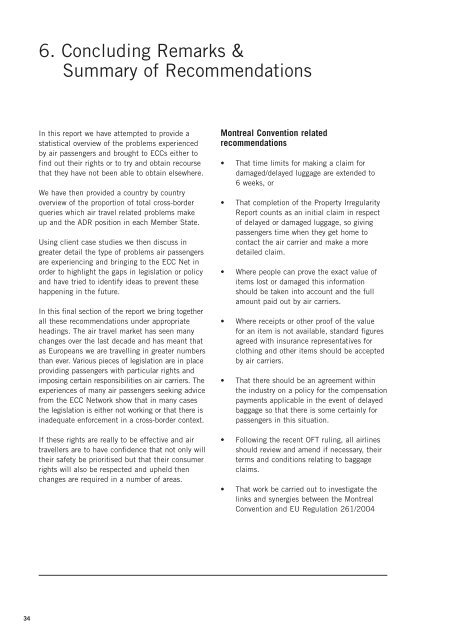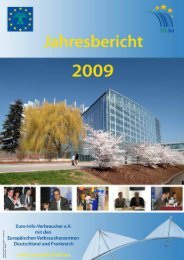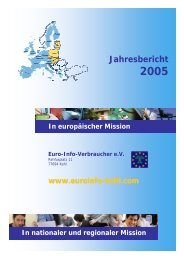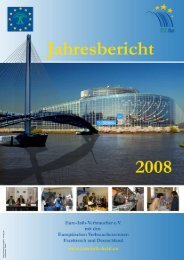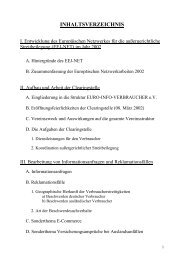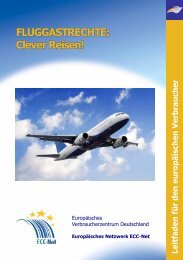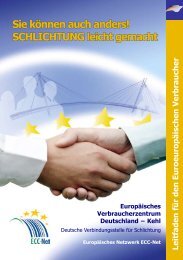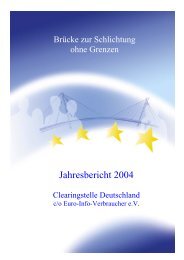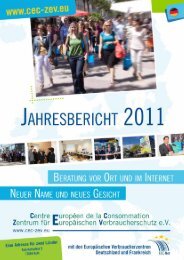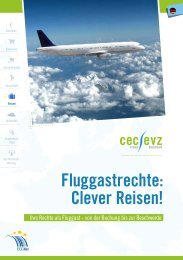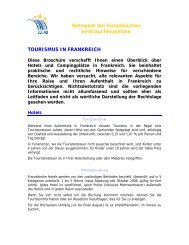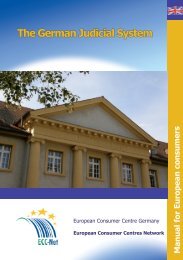Air Passenger Rights: - European Commission - Europa
Air Passenger Rights: - European Commission - Europa
Air Passenger Rights: - European Commission - Europa
You also want an ePaper? Increase the reach of your titles
YUMPU automatically turns print PDFs into web optimized ePapers that Google loves.
34<br />
6. Concluding Remarks &<br />
Summary of Recommendations<br />
In this report we have attempted to provide a<br />
statistical overview of the problems experienced<br />
by air passengers and brought to ECCs either to<br />
find out their rights or to try and obtain recourse<br />
that they have not been able to obtain elsewhere.<br />
We have then provided a country by country<br />
overview of the proportion of total cross-border<br />
queries which air travel related problems make<br />
up and the ADR position in each Member State.<br />
Using client case studies we then discuss in<br />
greater detail the type of problems air passengers<br />
are experiencing and bringing to the ECC Net in<br />
order to highlight the gaps in legislation or policy<br />
and have tried to identify ideas to prevent these<br />
happening in the future.<br />
In this final section of the report we bring together<br />
all these recommendations under appropriate<br />
headings. The air travel market has seen many<br />
changes over the last decade and has meant that<br />
as <strong>European</strong>s we are travelling in greater numbers<br />
than ever. Various pieces of legislation are in place<br />
providing passengers with particular rights and<br />
imposing certain responsibilities on air carriers. The<br />
experiences of many air passengers seeking advice<br />
from the ECC Network show that in many cases<br />
the legislation is either not working or that there is<br />
inadequate enforcement in a cross-border context.<br />
If these rights are really to be effective and air<br />
travellers are to have confidence that not only will<br />
their safety be prioritised but that their consumer<br />
rights will also be respected and upheld then<br />
changes are required in a number of areas.<br />
Montreal Convention related<br />
recommendations<br />
• That time limits for making a claim for<br />
damaged/delayed luggage are extended to<br />
6 weeks, or<br />
• That completion of the Property Irregularity<br />
Report counts as an initial claim in respect<br />
of delayed or damaged luggage, so giving<br />
passengers time when they get home to<br />
contact the air carrier and make a more<br />
detailed claim.<br />
• Where people can prove the exact value of<br />
items lost or damaged this information<br />
should be taken into account and the full<br />
amount paid out by air carriers.<br />
• Where receipts or other proof of the value<br />
for an item is not available, standard figures<br />
agreed with insurance representatives for<br />
clothing and other items should be accepted<br />
by air carriers.<br />
• That there should be an agreement within<br />
the industry on a policy for the compensation<br />
payments applicable in the event of delayed<br />
baggage so that there is some certainly for<br />
passengers in this situation.<br />
• Following the recent OFT ruling, all airlines<br />
should review and amend if necessary, their<br />
terms and conditions relating to baggage<br />
claims.<br />
• That work be carried out to investigate the<br />
links and synergies between the Montreal<br />
Convention and EU Regulation 261/2004


